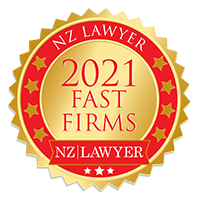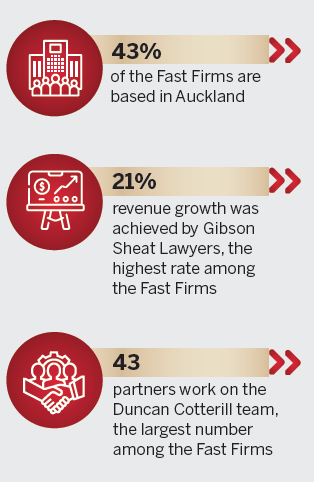

Jump to winners | Jump to methodology | View PDF
The onset of the COVID-19 pandemic heralded a difficult period for industries all over the world. Restrictions crippled many businesses, and as the pandemic dragged on, some found themselves throwing in the towel.
As their clients struggled, so did the legal profession. The rapid transition to remote working improved flexibility all around, but also made collaboration and interaction a greater challenge. As communicability and staff wellbeing became vital factors for firms. a number of them rose to the challenge by ensuring that initiatives and the technology they adopted served the needs of clients and staff alike.
Several firms also seized the opportunity to further strengthen their teams. Staff received more opportunities to move upwards and onwards in their careers, and firms recognised the value of providing training to prepare future leaders.
People power
For Auckland-based firm K3 Legal, people have been key to its momentum during such a challenging period. Managing director Edwin Morrison explains that the firm focuses on investing in people through promotions and recruitment, as well as by assigning staff more responsibility and offering them rewards.
“We are also actively growing our team into director roles, and we believe firmly in not holding on to equity as directors at the expense of growth,” Morrison says.
The firm’s flat hierarchy model, which provides staff with various opportunities for career growth, has become crucial to K3 Legal’s ability to sustain employees’ engagement in their work.
Another firm that recognised the importance of professional development opportunities for its staff is Anderson Lloyd, which recently received the distinction of being a large law firm after its partnership network grew to 26 members. At present, the firm’s leadership team is diverse, with 25% of the group being under the age of 40 and 42% of its equity partners being women.
“We offer well-attended training and continued professional development, and we endeavour to represent the communities in which we operate. We also have measurable gender objectives, from summer clerk recruitment to board representation,” CEO Richard Greenaway says.
“The firm also invests in our future leaders through a 12-month leadership program; peer-to-peer, senior and female mentoring; and making an executive coach available to all partners and staff.”
For Hamilton firm Norris Ward McKinnon (NWM), having the “right management structure, authentic leadership, partnership unity, empathy and strong communication” were the main factors that enabled the firm to adapt to the new environment created by the COVID-19 pandemic.
“It also helped that we entered COVID-19 with a long-term plan and united partnership, which meant we were able to approach the uncertainty of a post-COVID-19 world with a long-term perspective that helped us to avoid making knee-jerk decisions,” says general manager Carmen Simmonds and managing partner Sam Hood.
As a firm that saw its client base expand in the wake of the pandemic, NWM seeks to give staff “more opportunities to succeed.”
“The momentum of having great people doing their best work is magnetic. We try very hard to provide our people with lots of room to develop, balanced with strong mentoring, and we never let up on our culture – it’s the significant other in our relationship with growth,” Simmonds and Hood say.
Forging connections
Staff in many firms also welcomed the increasing normalisation of flexible working arrangements; indeed, the firms that were already equipped to handle remote working were the ones that generally sustained the least damage in the transition.
“We had been trialling digital tools in areas such as relationship management, document automation, contract review and intelligent automation to improve service and client and employee experience, and many of these tools were implemented more rapidly as the need for them had increased,” says Greenaway of Anderson Lloyd.
Wellington firm Gibson Sheat Lawyers was driven to go cloud-based – a move also welcomed by its clients.
“One of the learnings we had is that our reliance on some older technology has a finite end. In this space, we have now started shifts towards better cloud technology and mobile solutions,” says Cameron Madgwick, the firm’s CEO.
“Our switch to electronic interaction (eg video calls instead of face-to-face client meetings, e-signing, and others) was met with enthusiasm by our clients, and many have continued to work with us in this way – it was a great way to include new clients from around New Zealand more easily.”
IP specialist firm AJ Park utilised technology to ensure that staff members were receiving the support they needed.
“As a firm, the speed at which we had to pivot our business and become a remote office happened almost overnight. During this uncertain time, we felt it was important to stay connected with our people and support them in all aspects of their lives,” says managing director Andrea Dickens.
“Some of the initiatives we put in place to guide our people through this included an increase in two-way communication with our staff, additional IT tools and support to ensure a seamless office to home experience, and a reminder of the Employee Assistance Programme to ensure our people felt supported.”
In some cases, however, going completely remote also became a reminder of the importance of face-to-face interaction.
“Staff can become disengaged and disconnected. While we have measures in place to mitigate these effects from a work perspective, as employers we can’t fulfil our responsibilities well enough with remote working,” Morrison says.
“The productive culture that comes with everyone being in the office can’t be taken for granted. Therefore, we now believe that, while there will always need to be some degree of flexibility with work environments, this is still a less productive way of working.”
Sustaining momentum
As New Zealand faces a resurgence of the pandemic after a period of relative normality, firms have had to readjust once more to a tight environment.
“When the world throws you a curveball, it is vital to consider the potential change to your business through an opportunistic lens. There is now uncertainty and caution that didn’t exist before,” Madgwick says.
“Many businesses have faced their ‘worst-case scenarios’ in the last 16 to 18 months, and it is our responsibility as lawyers to share our knowledge to enable businesses and individuals to better plan and prepare for events that we might think will never happen – because they sometimes do happen.”
Many firms, including Anderson Lloyd, have focused on developing strategies to keep their momentum going through the pandemic and beyond.
“We have chosen to grow within strategically identified practice areas meaningful to us, with the ambition to adapt and contribute to a positive future, while nurturing a supportive and high-performing culture,” says Greenaway.
Meanwhile, AJ Park has developed a three-year strategy that is centred on “investing in our people, building our performance, deepening our relationships, and ensuring profitable growth”, Dickens says.
“Our clients are an important part of our success, and we think it’s important to understand their aspirations and where they want to get to before we act. So, we have also implemented several initiatives to stay connected with them, including our client listening and satisfaction programmes”, she explains.
To celebrate the law firms that adapted masterfully to a global pandemic and came out strong over the past year, NZ Lawyer presents this Fast Firms report. The law firms that made the list show that it is possible to not only survive COVID-19, but also to become bigger and better in the process.
On 14 June, NZ Lawyer invited submissions for its Fast Firms report, putting the spotlight to law firms in New Zealand that have not only been getting through COVID-19 but have blossomed during the pandemic.
Those who sought to make a nomination were asked to provide figures on their firms’ headcount and revenue for the 2020/2021 financial year. The firms with operations outside of New Zealand were to list only the figures related to their operations in this country.
The team reviewed the submissions after the nominations period closed on 9 July and identified the firms that displayed remarkable growth in terms of new partners, revenue, mergers/alliances and new offices launched.
At the end of the evaluation process, seven firms were revealed to have made the cut and are recognised as the Fast Firms in New Zealand.
